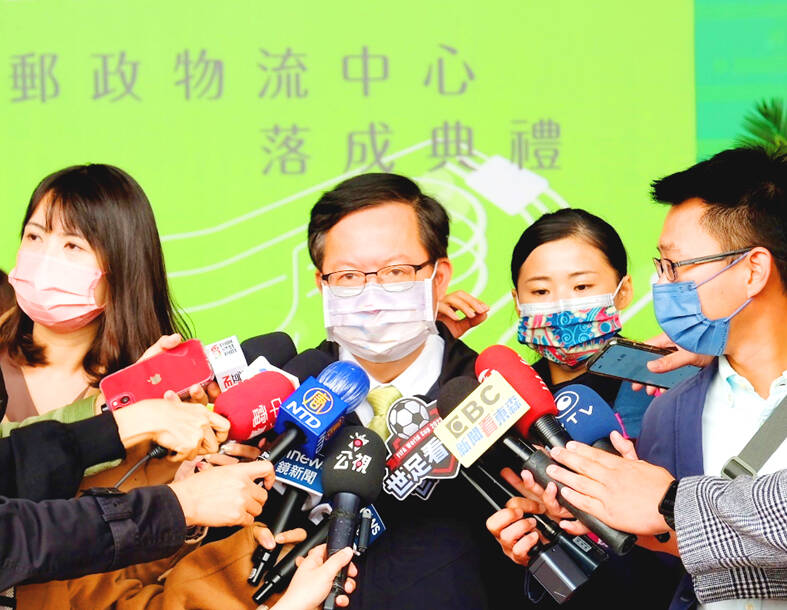Taoyuan Mayor Cheng Wen-tsan (鄭文燦) yesterday confirmed that he had received an official notice from National Taiwan University’s (NTU) College of Social Science of its decision to revoke his master’s degree and said that he respected the decision.
During the campaign for the nine-in-one elections, New Party Taoyuan mayoral candidate You Chih-pin (游智彬) alleged that Cheng had plagiarized his master’s degree thesis for NTU’s Graduate Institute for National Development.
Cheng said that the institute did not require that students use plagiarism checker programs, adding that he had successfully defended his paper before a panel of three professors on how the democratization of the Chinese public would not lead to a governmental change to democracy.

Photo: CNA
At the time of the study, conducting empirical studies on the topic was impossible, Cheng said, adding that he had instead performed an analysis of existing literature.
Cheng said he stood by his statements to the university’s Research Ethics Committee that his thesis was original and that the lack of citation was an oversight, not plagiarism.
Cheng said that had the institute mandated students use plagiarism-checker programs, he would have found out about the missed citation and would have provided the proper footnotes.
He said that he did not have time to verify all his sources, adding that he did not have some of the documents on hand at the moment to note down his citations.
Cheng said he was sorry for the oversight, but he had no intention of plagiarizing.
The lack of citations does not take away from the originality of his research, he said.
NTU yesterday confirmed that it had concluded its investigation into the matter, but declined to reveal its results.
The university said that its investigation followed all relevant regulations, adding that they already notified Cheng of the results.
The university will not let standards slide on academic ethics, it said.

Taiwan is stepping up plans to create self-sufficient supply chains for combat drones and increase foreign orders from the US to counter China’s numerical superiority, a defense official said on Saturday. Commenting on condition of anonymity, the official said the nation’s armed forces are in agreement with US Admiral Samuel Paparo’s assessment that Taiwan’s military must be prepared to turn the nation’s waters into a “hellscape” for the Chinese People’s Liberation Army (PLA). Paparo, the commander of the US Indo-Pacific Command, reiterated the concept during a Congressional hearing in Washington on Wednesday. He first coined the term in a security conference last

A magnitude 4.3 earthquake struck eastern Taiwan's Hualien County at 8:31am today, according to the Central Weather Administration (CWA). The epicenter of the temblor was located in Hualien County, about 70.3 kilometers south southwest of Hualien County Hall, at a depth of 23.2km, according to the administration. There were no immediate reports of damage resulting from the quake. The earthquake's intensity, which gauges the actual effect of a temblor, was highest in Taitung County, where it measured 3 on Taiwan's 7-tier intensity scale. The quake also measured an intensity of 2 in Hualien and Nantou counties, the CWA said.

The Overseas Community Affairs Council (OCAC) yesterday announced a fundraising campaign to support survivors of the magnitude 7.7 earthquake that struck Myanmar on March 28, with two prayer events scheduled in Taipei and Taichung later this week. “While initial rescue operations have concluded [in Myanmar], many survivors are now facing increasingly difficult living conditions,” OCAC Minister Hsu Chia-ching (徐佳青) told a news conference in Taipei. The fundraising campaign, which runs through May 31, is focused on supporting the reconstruction of damaged overseas compatriot schools, assisting students from Myanmar in Taiwan, and providing essential items, such as drinking water, food and medical supplies,

New Party Deputy Secretary-General You Chih-pin (游智彬) this morning went to the National Immigration Agency (NIA) to “turn himself in” after being notified that he had failed to provide proof of having renounced his Chinese household registration. He was one of more than 10,000 naturalized Taiwanese citizens from China who were informed by the NIA that their Taiwanese citizenship might be revoked if they fail to provide the proof in three months, people familiar with the matter said. You said he has proof that he had renounced his Chinese household registration and demanded the NIA provide proof that he still had Chinese